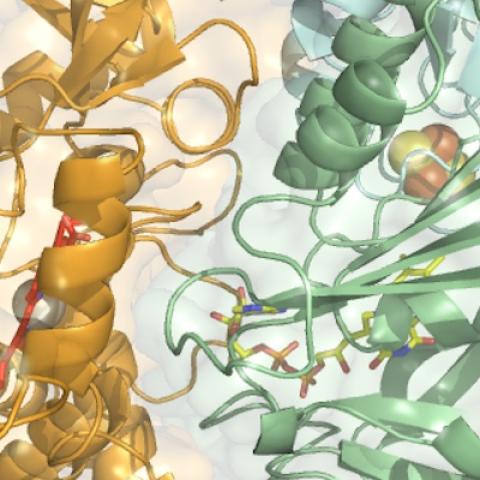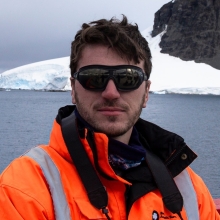
The Marine Biology research group is at the forefront of international projects investigating diverse marine topics, from the molecular to the ecosystem and community level.
Working in collaboration with scientists and industry from many different disciplines around the world, our research addresses some of the key environmental issues that we face in marine science with a special focus in advancing our knowledge of biological processes in marine ecosystems.
The central theme of our research is the interaction of humans with the marine environment. This is undertaken in a wide range of ecosystems and habitats from tropical mangroves to intertidal soft sediments and even deep-sea and polar regions, but with particular emphasis on coastal areas.
Our research is working to tackle pressing global issues, such as climate change, biodiversity loss, habitat degradation and ocean acidification. We're addressing pollution, aquaculture, overfishing and invasive species, and helping create sustainable marine governance. Our fundamental and applied research underpins and informs management of coastal and marine resources.
Our research aims to improve the quality of key habitats and protect these for future generations, such as providing guidelines on marine habitat restoration launched at COP26.
Restoration of key coastal habitats, resilience of marine organisms to climate change, understanding the interactions of marine species and anthropogenic impacts (pollution and habitat degradation), developing sustainable and renewable resources and valuing the services the marine environment provides are all essential for creating a resilient and sustainable approach to marine resource use and management.
Tackling these environmental issues is complex and requires expertise in many different disciplines and close collaboration between scientists from within the University, and national and international colleagues.
Research in the Biological Sciences
Explore some of our research within the School of Biological Sciences, meet some of our researchers and students, and find out what impact we're having on the environment.
Our research is focused on understanding the biodiversity. Particularly we focus on oyster reefs, seagrass, saltmarsh and kelp forests and our research really looks to see how marine organisms will function and how they respond to environmental pressures. So these are things such as overfishing, climate change, microplastics. A real problem here is all the excess of nutrients, which is called Eutrophication.
Ultimately, why it's called restoration ecology' is because the science we do underpins the protection of restoration of coastal habitats.
We've lost 95% of all our native oyster reefs and pretty much, half - as a conservative estimate - of all our seagrasses and salt marshes and these systems that are largely gone are really crucial for our human well-being, but also our planetary health, because they provide services that we absolutely rely on.
Such as, clean the water, they draw down carbon, so they help buffer climate change and we need a healthy marine environment for our own well-being because of these things, but also psychological benefits and well-being.
Microplastics are sort of a huge concern. We know there are a lot of them in the marine environment. We don't particularly know where they are, so we're analysing sediment water organisms to really find out the impacts.
Microplastics when they're out there, they're not clean. They get covered in a biofilm and we fed microplastics that are covered in the biofilm to oysters and compared those with plastics that are just clean and we found they took up ten times more microplastics. And the concern is that means that microplastics can more easily go up the food chain to higher trophic organisms, but also into humans.
We're really focussed on looking at how we can improve water quality within the marine environment, focusing on places like The Solent.
So these projects are linked with colleagues in France and in other institutions in the UK, and we're testing these different types of interventions.
These interventions involve growing oysters and looking at how those oysters develop and how good they are filtering out nutrients in places like Langstone Harbour.
We're also interested in culturing seaweed and seeing how good they are at absorbing those nutrients and also converting that algal mat which develops because of these elevated nutrients into something more useful like polychaete worms which can be used for aquaculture feed.
And finally, we are also trying to test how we can remove some of the algal mat, in an environmentally friendly way that minimises impact to those habitats and see then, if we can convert that algal mat into something more useful.
And those projects then link directly into restoration because if you're restoring seagrass, if you're restoring oysters, you need to understand the water quality that those oysters and those seagrass beds are going back into to make sure that they are appropriate for those restoration projects to flourish.
Our research is also underpinning the restoration of other blue carbon habitats, such as kelp forests and saltmarsh.
The aim of these projects is to trial methods to work out the most effective ways of both establishing and monitoring restoration sites in terms of both their restoration success and also the services that they provide to wildlife and people.
For example, in the River Hamble, we have a project pioneering the use of biodegradable structures placed in front of saltmarsh, which aim to promote the growth whilst also providing a substrate for oyster larvae to settle upon. And the monitoring around that project will investigate not only the effects of the structures on the saltmarsh and the oysters, but also the fish populations, the bird populations, the nutrient concentrations and the sediments of the local area.
For our MRes project, we've been working in collaboration with the Hampshire and Isle of Wight Wildlife Trust and Boskalis on the Solent Seagrass Restoration Project and what we've done so far is plant over 21,000 seeds in Farlington Marshes.
So the whole project is going to last one year and what we do is we go back every three or four months, sort of spring, summer, autumn, check on the seed, see how they're doing. Hopefully we'll see some growth soon. Part of our research is that Bron is going to be tracking blue carbon changes and I'm going to be tracking changes in biodiversity. And the great thing about this project is that it can continue past the year that we're doing our research and for the years to come.
So we're here in the algal culture room which is the first in a variety of rooms for the production of the native oysters. The larvae and the adult oysters will be requiring this kind of feed. So this is the first batch that will go into that production this year. Oysters do us a great service by filtering impurities from the seawater and improving coastal water quality.
A healthy oyster can filter an astonishing 140 litres of seawater a day, consuming algae and other organic material. They also create a unique seabed habitat, forming aggregations and supporting restructures, providing nursery fishing grounds and a whole host of environments for other marine life.
Here at the Institute of Marine Sciences, we have built the UK's first restoration focussed oyster hatchery, focussing on the native species.
The research we're doing here is to overcome some of the knowledge gaps around the reproduction and hatchery production, and we're also investigating the resistance to disease. So we have Bonamiosis, which is a disease that's wiped out lots of oysters and it's present in the South. But we also have a disease resistant remnant stock.
So what we're doing is we're taking local stock into the hatchery, breeding from them and this way you benefit from both their genetic resistance to the disease, but also their local adaptation to the condition. And so, the research is being done here by our team and Monica Fabra, our PhD student is really trying to solve some of these barriers to this production of this larvae that is then settled on, spat-on-shell. So we settled the larvae on shell and we put the shell and the larvae out into the environment and that's like kickstarting the natural lifecycle of the native oyster.
There's been growing interest in blue carbon habitats because they have potential to offset carbon emission, support climate change mitigation. As such, the services they provide, such as carbon sequestration can be seen as a product and in that way, these carbon credits can be used to offset carbon emissions that we couldn't otherwise reduce.
This can be used to kind of incentivise wider financial support for the protection and restoration of these habitats.
So for instance, they sequester carbon in two ways. The first ways through that plants photosynthetic activity and the second way is through their canopy, it reduces the water flow and this enables the sedimentation to be enhanced.
In this way, our research is looking at fine tuning carbon flux in these habitats so that we can support financial investment and then the habitat restoration work that goes along side that.
In 2017, I co-founded the Native Oyster Network with the Zoological Society of London. I led a suite of handbooks that launched at COP26 last November, which enables the restoration and shows people how to do the restoration of seagrass. The overall goal of our research is to help facilitate bending the curve back for future generations, to increase biodiversity and all the services that will mitigate and help protect against climate change.
We have direct links with other leading centres at the University, including the Centre for Blue Governance, the Centre for Enzyme Innovation, the Institute of Marine Sciences, and the Institute of Biological and Biomedical Sciences.
Our work is regularly featured in major scientific publications, and in the national and international media, and our work on oyster and kelp restoration, shipworms, artificial reefs and climate change has been covered by the likes of The Guardian, BBC, New York Times, ITV, Forbes and the New Scientist.
Recent projects have received funding from major funding organisations, including the Natural Environment Research Council (NERC), the Biotechnology and Biological Sciences Research Council (BBSRC), Research Council UK, the European Union, the Leverhulme Trust, the Environment Agency, Natural England and The Royal Society.


Our research topics
The Biodiversity and Evolution group explores the diversity of life at levels ranging from the molecular and genetic, to organismal and ecosystem. Among others, we have ongoing research on the biology and symbiosis of wood-boring invertebrates and a machine learning project decoding sound in the deep ocean. We employ population genetic and phylogenetic tools to understand the evolution and ecology of deep-sea fauna and ascertain their resilience in the face of anthropogenic impacts. There is also a strong focus on biotechnology. Researchers at the Institute of Marine Sciences are investigating sustainably-produced liquid fuel alternatives to fossil fuels.
One of the greatest challenges facing the planet and human kind is climate change. Understanding the changes in environmental processes taking place across the planet, and the consequences of these changes, is critical to our understanding of the sustainability of the biosphere.
The global science community has only recently started to understand the pivotal role of the oceans in removing and storing atmospheric carbon into marine ecosystems and sediments for long periods of time — a term coined “blue carbon”. The University of Portsmouth is a founding member of the UK Blue Carbon Forum formed to address the important role of blue carbon in mitigating the current ecological and climate emergencies.
Within the School of Biological Sciences, researchers are investigating the impacts of climate change in marine ecosystems using a variety of complementary approaches including ecological monitoring, molecular biology, ecophysiology techniques, modelling and remote sensing.
We have ongoing research into species' range shift and invasive species under climate change, and the effect of environmental variables on the reproductive and sex determination of invertebrates.
Our researchers are also quantifying carbon flux and storage in blue carbon habitats including mangroves, seagrass, saltmarsh, and Antarctic coastal environments to enable nature based solutions for carbon sequestration and to improve global climate models used to inform policy makers.
With the challenge of a climate crisis, faced by a growing world population, we need to protect and restore ecological systems that provide the solutions and resilience to these challenges.
Coastal marine ecosystems — such as saltmarshes, seagrasses, oyster reefs, kelp forests and mangrove forest ecosystems — draw down significant quantities of carbon, protect our coastlines from sea level rise and storms, reduce ocean acidification, provide clean water and enhance fish stocks. Yet they are some of the most imperilled ecosystems on our planet that have suffered catastrophic losses of up to 95% due to high overlap with human activities.
We're involved with several habitat restoration projects — including native oysters, saltmarsh and seagrasses — that evaluate the ecosystem services that such habitats provide. These projects share an overall aim to restore the Solent’s blue carbon habitats.
Humans depend on ocean ecosystems for important and valuable goods and services, but human use has also altered the oceans through direct and indirect means such as runoff of pollutants, nutrients and habitat alteration/destruction. Critical to the understanding of how humans impact their environment is the study of animal’s behaviour in response to human activities.
The Institute of Marine Sciences benefits from a strong team with a broad experience in environmental toxicology, pollution and animal behaviour across a range of species including microbes, plants, algae, aquatic invertebrates and vertebrates. Projects carried out in IMS range from the impact of algal mats on coastal habitat, to quantifying vessel-collision risks for large whales.
Our marine microbiology research applies molecular tools to better understand microbial diversity and interactions in the environment. These analyses fall into two main areas:
- The degradation of recalcitrant natural products, persistent organic pollutants and solid polymer substrates for industrial applications.
- Antimicrobial resistance in aquatic environments, especially its transfer and concentration in environments affected by wastewater releases and in aquaculture systems.
Coastal waters of the tropics and subtropics possess unique and highly productive ecosystems, including mangrove forests, seagrass meadows, and coral reefs. These ecosystems provide services upon which millions of people around the globe depend.
Our Institute of Marine Sciences has a team of highly experienced tropical ecologists investigating topics that inform habitat management to maintain the function of these ecosystems.
Our Tropical Ecology research includes conservation of threatened species, human impacts on coastal nursery areas, community structure and fishery management. We also look at how to improve the indicators we use to monitor biodiversity through multidisciplinary approaches, from species to the delivery of ecosystem services.
The Southern Ocean is one of the most remote and extreme parts of the global ocean. Some regions of the Southern Ocean have been experiencing rapid warming, which has led to significant ice loss (i.e. in glacial systems, sea-ice, ice shelves) over the past century. Many wildlife species depend directly or indirectly on these ice systems.
Research carried out at the Institute of Marine Sciences investigates the impacts of ice loss (glacial retreat and sea ice reduction) on the Antarctic coastal benthic ecosystems. Our research focuses on the effects of climate change on marine biodiversity and conservation of these remote environments.
This multidisciplinary research involves the collaboration of colleagues from the British Antarctic Survey, University of Exeter, Bangor University and Universidad Católica de la Santísima Concepción in Chile.
Sclerochronology is the study of growth increments from the hard skeletal parts of organisms (e.g. teeth, shells, coral growths). Similar to the study of tree-rings (dendrochronology), sclerochronology can help us to understand how the marine environment has been changing over long periods of time on a year-to-year basis.
Our research at the Institute of Marine Sciences focuses mainly on long-lived marine bivalves, some of which are found on the UK coast. Understanding the growth patterns within the shells can inform us of past and present population dynamics (a very useful tool in marine resources management and conservation), climate change in the ocean, and marine pollution; making sclerochronology a highly multidisciplinary research discipline.
Recent research outputs
-
A global horizon scan of issues impacting marine and coastal biodiversity conservation
Herbert-Read, J.E., Thornton, A., Amon, D.J. et al. Nature Ecology & Evolution (2022). https://doi.org/10.1038/s41559-022-01812-0
-
Biomimetic generation of the strongest known biomaterial found in limpet tooth
Rumney RMH, Robson SC, Kao AP, Barbu E, Bozycki L, Smith JR, Cragg SM, Couceiro F, Parwani R, Tozzi G, Stuer M, Barber AH, Ford AT, Górecki DC. Nature Communications. (2022) Jul 7;13(1):3753. doi: 10.1038/s41467-022-31139-0
-
The increased prevalence of Vibrio species and the first reporting of Vibrio jasicida and Vibrio rotiferianus at UK shellfish sites
Harrison, J., Nelson, K., Morcrette, H., Morcrette, C., Preston, J., Helmer, L. D., Titball, R., Butler, C., & Wagley, S. (2022). Water Research, 211, [117942]. https://doi.org/10.1016/j.watres.2021.117942
-
Biodegraders of large woody debris across a tidal gradient in an Indonesian mangrove ecosystem
Hendy, I. W., Shipway, J. R., Tupper, M., Etxabe, A. G., Ward, R. D., & Cragg, S. M. (2022). Frontiers in Forests and Global Change, 5, [852217].
-
The plastic Trojan horse: Biofilms increase microplastic uptake in marine filter feeders impacting microbial transfer and organism health
Fabra, M., Watts, J., Hale, M., Couceiro, F., & Preston, J. (2021). Science of the Total Environment, 797, [149217]. https://doi.org/10.1016/j.scitotenv.2021.149217
Facilities
Among the facilities the group uses at the University are the Institute of Marine Sciences' Aquatic Centre, which has recirculating and flow-through aquarium systems including the Solent Oyster Restoration and Research Hatchery. We have a range of underwater sonar and acoustics survey technology, sampling equipment, and two research vessels — RV Noctiluca and RV Calypso.
We also make use of the University's molecular biology laboratories, and the Electron Microscopy and Microanalysis Unit (see images below), which is home to TEM, SEM with EDS elemental microanalysis capability and a field emission gun for delicate specimens such as plastic.
Post-doc and PhD students
Post-doc/research:
- Dr Kabari Sam
- Dr Andrew Van Der Schatte Olivier
- Dr Susanne Vogeler
- Zoe Morrall
- Eric Harris-Scott
PhD students:
- Peter Barfield
- Kate Dey
- Monica Fabra
- Elea Giraud
- Bidemi Green-Ojo
- Lucy Martin
- Charles Mountain
- Henry Obanya
- Emily Price
- James Robbins
- Emma Ward
Discover more Biology research
Ecology and Evolution Research Group
We're expanding knowledge of the diversity of the living world, from molecules to ecosystems, and creating a basis for assessing and reversing the extinction of species.

Biological Sciences
We're exploring how to treat genetic disorders, identifying novel targets for drugs and searching for advances in treatments that could impact millions.

Biophysics and Molecular Genetics Research Group
We're studying biomolecules such as DNA, RNA and proteins to allow us to tackle issues such as disease, pollution and energy.






